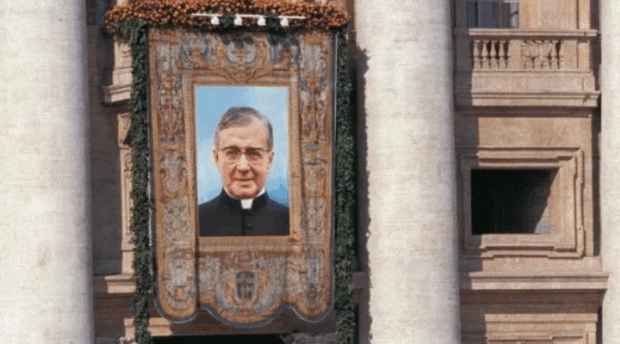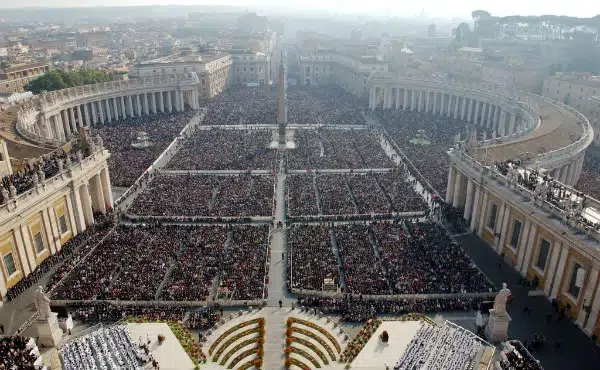
Every June 26, the Catholic Church celebrates the feast of St. Josemaría Escrivá, founder of Opus Dei. Hundreds of thousands of people today remember "the saint of ordinary life," as St. John Paul II called him. On this special day, many gather at Holy Mass to honor his memory.
"Following in his footsteps," the Pope said in his homily on the occasion of his canonization of St. Josemaría, "spread in society, without distinction of race, class, culture or age, the awareness that we are all called to holiness.
The figure of St. Josemaría continues to inspire many on their path to holiness. If you would like to pray before his remains, you can go to the church at Santa Maria della Pace (in Rome).
St. Josemaría's identity as founder has left an indelible mark on today's world. He had the art of knowing how to express great realities in brief and simple words. This happens, for example, when he speaks on the theme of priestly identity, which is questioned and problematized by some, and he resolved it with resounding clarity: "The priest, whoever he may be, is always another Christ..
Another Christ, Ipse ChristusThe priest can consecrate the Body and Blood of Christ, offer to God the Holy Sacrifice, forgive sins in sacramental confession and exercise the ministry of indoctrinating people. The priest can consecrate the Body and Blood of Christ, offer to God the Holy Sacrifice, forgive sins in sacramental confession and exercise the ministry of indoctrinating people". (The Way, 6).
He always looked upon the diocesan priests as his brothers.He used to say to them: "My brother priests," he used to say when addressing them. I felt a brotherly affection for them and to the priests of the Prelature of Opus Dei he invited them to feel like diocesan priests in all the dioceses of the world.
Lived and promoted an authentic love for priests and always gave proof of it. He was an example of zeal for priestly formation.He demonstrated this in the solicitude with which he guided the activity of the Priestly Society of the Holy Cross, which enables priests from all the dioceses of the world to share their spirituality.

The CARF Foundation follows this example of the founder of the Work, as he affectionately called it, by supporting the priestly formation. For this reason the Foundation acts to provide, with the help of benefactors, study aids for poor diocesan priests and seminarians from dioceses around the world.The students of the University of Navarra, Spain, will receive a solid theological, human and spiritual preparation at the Pontifical University of the Holy Cross in Rome and at the Ecclesiastical Faculties of the University of Navarra in Pamplona, Spain.
In addition, promoted the importance of prayer in the life of the presbyter. "Do not cease to pray for them, that they may always be faithful priests, pious, learned, dedicated, joyful! Entrust them especially to Holy Mary, who will be especially solicitous as a Mother for those who are committed for life to serve her Son, Our Lord Jesus Christ, Eternal Priest".
Bishop Javier Echevarría explains that throughout his long pastoral experience, the founder of Opus Dei continuously experienced the need for a strong priestly identityis not true that Christians want to see in the priest The Christian people want the priest to be a priest.
In the words of St. Josemaría, "let the priest's priestly character be clearly emphasized: they expect him to pray, not to refuse to administer the sacraments, to be ready to welcome everyone without becoming the leader or militant of human factions, of whatever kind.
Moreover, that he put love and devotion into the celebration of the Holy Mass, that he sit in the confessional, that he console the sick and the afflicted; that he indoctrinate children and adults with catechesis, that he preach the Word of God and not any kind of human science that - even if he knew perfectly well - would not be the science that saves and leads to eternal life; that he have counsel and charity for the needy. In a word: the priest is asked to learn not to hinder the presence of Christ in him". Homily Priest for eternity, April 13, 1973.
Javier Echevarría, can perhaps sum up the challenge that today's world throws down to sacred ministers. To men and women of all times, the priest must make God presentAnd for this, he must learn to lend Christ his voice, his hands, his soul and his body: all that is his.
This happens mainly when he administers the sacraments or in preaching, but not only in those moments. The dynamics proper to the sacrament of Holy Orders, whose center and culmination is the Eucharist, lead to to give himself entirely, body and soul, to Christ.
Short texts about the life and vocation of priests that we remember on the occasion of his feast day.
Bibliography
Camino.
It is Christ who passes.
Homily Priest for eternity.
Forge.
Homily Pope St. John Paul II at the Mass of canonization, 2002.
Homily Pope St. John Paul II at the Mass of beatification, 1992.
Homily Javier Echevarría on the priesthood, 2009.